(完整word版)初中英语一般现在时教案
一般现在时态教案-+2024-2025学年人教版英语七年级上册

必考语法--一般现在时态以及练习 2024-2025学年人教版英语七年级上册主备人备课成员教学内容本节课为人教版英语七年级上册的必考语法--一般现在时态以及练习。
课程主要内容围绕一般现在时态的构成、用法及动词的三单形式变化规则进行讲解,并通过练习巩固所学知识。
具体内容包括:1. 一般现在时态的构成:主语+动词原形(be动词/行为动词)+其他。
2. 一般现在时态的用法:描述习惯性动作、普遍真理、客观事实等。
3. 动词的三单形式变化规则:a. 以字母s结尾的动词,直接在词尾加上es,如:play->plays。
b. 以字母sh、ch、th结尾的动词,在词尾加上-es,如:watch->watches。
c. 以辅音字母+元音字母结尾的动词,在词尾加上-es,如:go->goes。
d. 以元音字母+辅音字母结尾的动词,在词尾加上-s,如:do->does。
4. 练习:完成教材P44-45的练习题,巩固一般现在时态及动词三单形式的运用。
核心素养目标本节课旨在培养学生的英语学科核心素养,主要包括语言能力、文化意识、思维品质和学习策略。
通过学习一般现在时态的构成、用法及动词的三单形式变化规则,学生能够更好地运用英语描述日常生活中的事物和行为,提高语言运用能力。
同时,通过练习题的完成,培养学生的思维品质,提高他们分析问题和解决问题的能力。
此外,学生还能通过学习英语语法,了解西方文化背景,增强文化意识。
为了提高学习效果,教师将引导学生运用恰当的学习策略,如合作学习、任务型学习等。
学习者分析1. 学生已经掌握了哪些相关知识:学生在之前的英语学习中,已经掌握了简单的英语词汇和基本的日常交流用语。
他们对英语有一定的认识,能够进行简单的英语对话。
此外,学生已经学习了动词的一般过去时态,对时态的概念有一定的了解。
2. 学生的学习兴趣、能力和学习风格:七年级的学生对新鲜事物充满好奇,具有较强的学习兴趣。
初中英语时态教案

初中英语时态教案一、教学目标1. 让学生掌握英语的基本时态,包括一般现在时、一般过去时、一般将来时、现在进行时、过去进行时、现在完成时、过去完成时和将来完成时。
2. 培养学生运用英语时态描述动作或状态的能力。
3. 提高学生听说读写四项基本技能,增强英语语感。
二、教学内容1. 第一课时:一般现在时1.1 引入概念:一般现在时表示经常发生的动作或存在的状态。
1.2 动词形式:主语+动词原形1.3 句子结构:主语+动词原形+其他2. 第二课时:一般过去时2.1 引入概念:一般过去时表示过去发生的动作或存在的状态。
2.2 动词形式:主语+动词过去式2.3 句子结构:主语+动词过去式+其他3. 第三课时:一般将来时3.1 引入概念:一般将来时表示将来发生的动作或存在的状态。
3.2 动词形式:主语+will+动词原形3.3 句子结构:主语+will+动词原形+其他4. 第四课时:现在进行时4.1 引入概念:现在进行时表示正在进行的动作或存在的状态。
4.2 动词形式:主语+am/is/are+动词ing形式4.3 句子结构:主语+am/is/are+动词ing形式+其他5. 第五课时:过去进行时5.1 引入概念:过去进行时表示过去正在进行的动作或存在的状态。
5.2 动词形式:主语+was/were+动词ing形式5.3 句子结构:主语+was/were+动词ing形式+其他三、教学方法1. 交际法:通过情景设定,让学生在实际语境中运用英语时态。
2. 任务型教学法:通过完成特定任务,让学生在实践中掌握英语时态。
3. 直观演示法:利用图片、实物等直观教具,帮助学生理解英语时态。
四、教学评价1. 课堂参与度:观察学生在课堂活动中的参与程度,了解他们对英语时态的掌握情况。
2. 练习完成情况:检查学生完成练习的情况,评估他们对英语时态的运用能力。
3. 课后作业:布置相关时态的作业,要求学生在课后巩固所学知识。
五、教学资源1. PPT课件:制作有关英语时态的PPT课件,辅助教学。
初中英语一般现在时态教案

初中英语一般现在时态教案第一课时【教学目标】1. 了解一般现在时的基本形式和用法;2. 能够正确使用一般现在时表达日常活动;3. 能够运用一般现在时回答简单问题。
【教学重点】1. 掌握一般现在时的构成和用法;2. 能够熟练使用一般现在时进行日常活动的表达;3. 能够灵活运用一般现在时回答问题。
【教学难点】1. 能够正确使用一般现在时表达日常活动;2. 能够运用一般现在时回答简单问题。
【教学过程】Step 1: 导入新课1. Greetings and warm-up:- Greet the students and ask them how they are doing.- Engage in a short conversation with the students using the sentence pattern: "How are you? I'm fine, thank you."2. Introduce the topic:- Write "Simple Present Tense" on the board and ask students if they know what it means.- Explain that the simple present tense is used to talk about routines and things that happen regularly.- Give examples such as "I go to school every day" and "He likes to play soccer."Step 2: 学习一般现在时的构成和用法1. Present the basic form:- Write the basic form of the verb on the board and explain that we use this form to make simple present tense sentences.- Show examples of verbs such as "play," "eat," and "study."2. Explain the third person singular form:- Explain that for the third person singular (he, she, it), we add "s" or "es" to the verb.- Give examples such as "She plays soccer" and "He eats breakfast."3. Practice using the simple present tense:- Provide students with a list of verbs and ask them to create simple present tense sentences using the correct form of the verb.- Monitor and provide assistance as needed.Step 3: 运用一般现在时进行日常活动的表达1. Introduce daily routines vocabulary:- Teach students a list of vocabulary words related to daily routines such as "wake up," "brush teeth," "eat breakfast," etc.- Model the pronunciation and have students repeat after you.2. Complete the activity:- Distribute a worksheet with pictures depicting daily activities.- Instruct students to write sentences in the simple present tense describing what each person is doing.- Monitor and provide guidance as needed.Step 4: 用一般现在时回答问题1. Introduce question words:- Write question words such as "What," "Who," and "Where" on the board.- Explain that we use these words to ask questions about daily activities.2. Model question formation:- Model how to form questions using the simple present tense, e.g., "What does he do in the morning?"3. Pair work:- Have students work in pairs to ask and answer questions about each other's daily routines.- Walk around the classroom and provide support as necessary.【教学反思】本课时通过一般现在时的基本形式和用法的引导,帮助学生掌握该时态的构成和用法,以及运用一般现在时进行日常活动的表达和回答问题。
一般现在时讲解教案

一、教学目标:1. 让学生理解一般现在时的概念和用法。
2. 能够正确运用一般现在时描述经常发生的动作或存在的状态。
3. 学会一般现在时的句子结构。
二、教学内容:1. 一般现在时的定义和用法。
2. 一般现在时的句子结构:主语+ 动词原形/动词三单。
3. 一般现在时的常见时间状语:always, usually, often, sometimes, never, rarely等。
三、教学重点与难点:1. 教学重点:一般现在时的概念、用法和句子结构。
2. 教学难点:一般现在时的句子结构转换和时间状语的运用。
四、教学方法:1. 采用情境教学法,通过生活情境引导学生理解和运用一般现在时。
2. 使用任务型教学法,让学生在完成任务的过程中巩固一般现在时的知识。
3. 运用小组合作学习,提高学生的参与度和积极性。
五、教学过程:1. 导入:利用图片或实物展示,引出一般现在时的概念。
2. 讲解:讲解一般现在时的定义、用法和句子结构。
举例说明一般现在时的常见时间状语。
3. 练习:让学生进行一般现在时的句子练习,注意句子结构的正确性。
4. 任务:布置一道生活情境题,让学生运用一般现在时完成任务。
5. 总结:对本节课的内容进行总结,强调一般现在时的关键点。
6. 作业:布置相关练习题,让学生巩固所学知识。
7. 课后反思:针对课堂教学效果,进行课后反思,为下一节课的教学做好准备。
六、教学评价:1. 评价学生对一般现在时的概念和用法的理解程度。
2. 评价学生能否正确运用一般现在时描述经常发生的动作或存在的状态。
3. 评价学生掌握一般现在时的句子结构和时间状语的运用情况。
七、教学资源:1. 课件:制作包含一般现在时定义、用法、句子结构和时间状语的课件。
2. 练习题:准备一些一般现在时的练习题,包括选择题、填空题和句子改写题。
3. 生活情境题:设计一些与学生生活相关的情境题,让学生运用一般现在时解决实际问题。
八、教学进度安排:1. 课时:本节课计划用2课时完成一般现在时的教学。
一般现在时教案
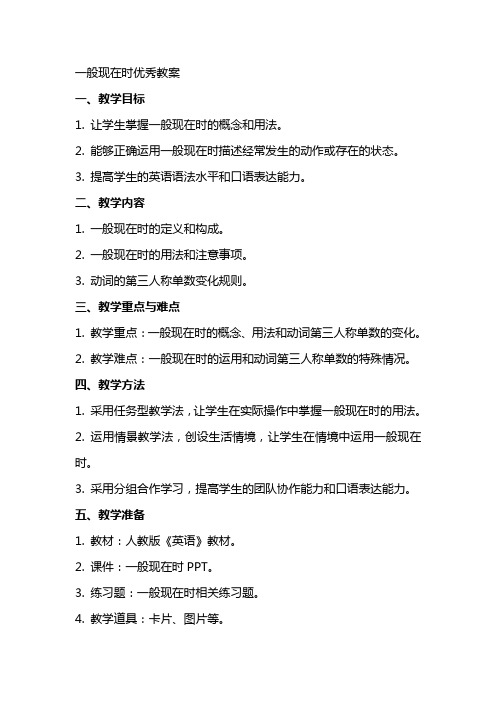
一般现在时优秀教案一、教学目标1. 让学生掌握一般现在时的概念和用法。
2. 能够正确运用一般现在时描述经常发生的动作或存在的状态。
3. 提高学生的英语语法水平和口语表达能力。
二、教学内容1. 一般现在时的定义和构成。
2. 一般现在时的用法和注意事项。
3. 动词的第三人称单数变化规则。
三、教学重点与难点1. 教学重点:一般现在时的概念、用法和动词第三人称单数的变化。
2. 教学难点:一般现在时的运用和动词第三人称单数的特殊情况。
四、教学方法1. 采用任务型教学法,让学生在实际操作中掌握一般现在时的用法。
2. 运用情景教学法,创设生活情境,让学生在情境中运用一般现在时。
3. 采用分组合作学习,提高学生的团队协作能力和口语表达能力。
五、教学准备1. 教材:人教版《英语》教材。
2. 课件:一般现在时PPT。
3. 练习题:一般现在时相关练习题。
4. 教学道具:卡片、图片等。
六、教学过程1. 导入:通过与学生谈论日常生活中的习惯和行为,引出一般现在时的概念。
2. 讲解:讲解一般现在时的定义、构成和用法,重点讲解动词第三人称单数的变化规则。
3. 互动:学生分组讨论,举例说明一般现在时的用法。
4. 练习:学生完成一般现在时的相关练习题,教师点评并讲解。
5. 拓展:引导学生运用一般现在时描述自己的家庭成员和朋友。
七、案例分析通过分析一些日常生活中的案例,让学生更好地理解和运用一般现在时。
例如:1. 描述自己的作息时间:I get up at 7 o'clock in the morning and go to school at 8 o'clock.2. 描述朋友的兴趣爱好:My friend likes playing soccer and he isa good player.八、课堂小结总结本节课所学内容,强调一般现在时的用法和动词第三人称单数的变化规则。
鼓励学生在日常生活中多运用一般现在时进行交流。
(完整版)一般现在时教案
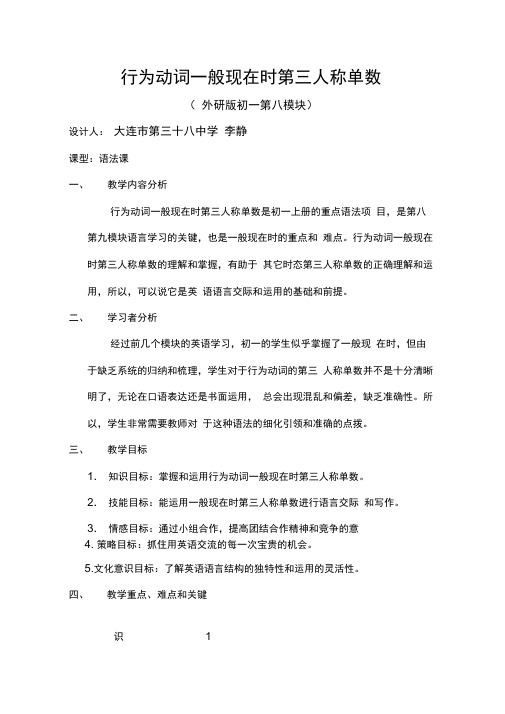
行为动词一般现在时第三人称单数(外研版初一第八模块)设计人:大连市第三十八中学李静课型:语法课一、教学内容分析行为动词一般现在时第三人称单数是初一上册的重点语法项目,是第八第九模块语言学习的关键,也是一般现在时的重点和难点。
行为动词一般现在时第三人称单数的理解和掌握,有助于其它时态第三人称单数的正确理解和运用,所以,可以说它是英语语言交际和运用的基础和前提。
二、学习者分析经过前几个模块的英语学习,初一的学生似乎掌握了一般现在时,但由于缺乏系统的归纳和梳理,学生对于行为动词的第三人称单数并不是十分清晰明了,无论在口语表达还是书面运用,总会出现混乱和偏差,缺乏准确性。
所以,学生非常需要教师对于这种语法的细化引领和准确的点拨。
三、教学目标1.知识目标:掌握和运用行为动词一般现在时第三人称单数。
2.技能目标:能运用一般现在时第三人称单数进行语言交际和写作。
3.情感目标:通过小组合作,提高团结合作精神和竞争的意4. 策略目标:抓住用英语交流的每一次宝贵的机会。
5.文化意识目标:了解英语语言结构的独特性和运用的灵活性。
四、教学重点、难点和关键识11.教学重点:行为动词一般现在时第三人称单数的结构体系和正确运用。
2.教学难点:行为动词一般现在时第三人称单数运用于交际和表达。
3.教学突破的关键:a. 采用多媒体教学,运用形象的图片和彩色字体的强化; b. 采用顺口溜的形式,提高学生的学习兴趣,强化学生的记忆; c. 小组合作,取长补短,共同完成学习任务。
五、教学步骤与设计意图1. Pre-teaching课前播放大屏幕图片和歌曲the school day, 让学生在轻松和愉快的氛围下进入语法的学习。
Students stand up and greet ,Not sittingdown ,the teacher gets the students to talk about“ My school day ”in pairs ,设计意图:激情引趣,为上课创造良好的学习氛2. Homework checking(share )Get the Volunteers to share “Myschool day” with the class 设计意图:检查作业,为下面的第三人称单数的语言交际打好基础,基础好的学生可以对第三人称单数有少量的使用3. PresentationA. Question and answer23 The teacher:我们以上的交流运用了什么时态?The students:学生回答:一般现在时.The teacher:你怎样理解这种时态?The students: —般的状况或经常发生的动作.The teacher:我们现在学习了几种动词的一般现在时呢?The stude nts:系动词,情态动词和行为动词;(学生在 回答时,答案可能有偏差,教师作好引领)The teacher shows the senten ces on the scree n:a. Tom is from En gla nd.b. He can speak English very well.c. We often get up at six every day.The students: a. 动词用原形b.主语是第三人称单数时,动 词加s .The teacher: 什么样的词和短语是第三人称单数?B. words and phrases The teacher : 我们发现行为动词一般现在时的运用有几种情 She ofte ngets up at six.况?细节掌握、快速反映1:从下面的单词和短语中找出第三人称单数(在题号前划v )1). my friend 7). the boy 's parents2). our teacher 8). your teachers3). your name 9). our class4).their brother 10). Tom and Lucy5). her pens 11).the chair6). Lucy and Lily 's parent 12). DaMing with his parents与学生研究为什么1 ).2).3).4).6).9).11).12) 是第三人称单数,而其他的不是第三人称单数。
一般现在时全英文教案
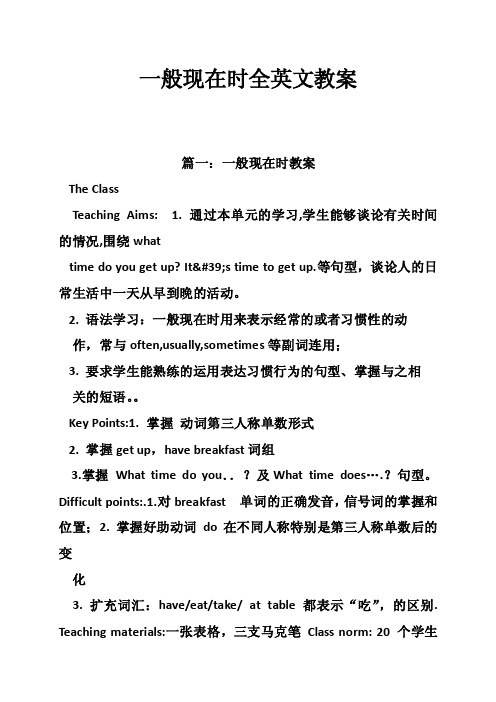
一般现在时全英文教案篇一:一般现在时教案The ClassTeaching Aims: 1. 通过本单元的学习,学生能够谈论有关时间的情况,围绕whattime do you get up? It's time to get up.等句型,谈论人的日常生活中一天从早到晚的活动。
2. 语法学习:一般现在时用来表示经常的或者习惯性的动作,常与often,usually,sometimes等副词连用;3. 要求学生能熟练的运用表达习惯行为的句型、掌握与之相关的短语。
Key Points:1. 掌握动词第三人称单数形式2. 掌握get up,have breakfast词组3.掌握What time do you..?及What time does….?句型。
Difficult points:.1.对breakfast 单词的正确发音,信号词的掌握和位置;2. 掌握好助动词do在不同人称特别是第三人称单数后的变化3. 扩充词汇:have/eat/take/ at table都表示“吃”,的区别. Teaching materials:一张表格,三支马克笔Class norm: 20 个学生气氛较活跃。
Culture aims: 本单元的核心教学项目是“习惯性为”,即用英语询问某个人物的职业在不同时间的活动的语言。
教育学生询问他人的时候用句型what time do you get up?要求学生掌握好助动词do在不同人称特别是第三人称单数后的变化。
通过学习本单元内容使学生了解人在不同时间所作的事情。
Contents:Step 1. Greeting and warm up/ review.T:Hello boys and girls ,how are you today ? S: I am …. Step 2. lead-in.T:Tell me ,how was your weekend ? happy or soso ? What time do you get up ?S:7点,六点T: Give me the whole sentence,I usually get up at 6 o’clock everyday. S: I get up at…T:个体操练,问一个S, What time do you go to school..?S: I usually go to school at …(把这个问题和回答板书) T: 整体操练,问全班What time does she/he go to school..? S: She usually goes to school at …(把这个回答和问题板书)Step 3. Presentation.T:今天我们学习的是一般现在时的第一种情况,就是一般现在时表示经常发生的动作或经常存在的状态日常行为习惯。
一般现在时教案范文

一般现在时教案范文教案:一般现在时教学目标:1.学习什么是一般现在时,以及如何正确运用一般现在时。
2.通过一些练习和活动,加深学生对一般现在时的理解和记忆。
教学重点:学生能够正确运用一般现在时,用适当的时间状语表达自己的日常行为和习惯。
教学难点:理解一般现在时的概念,并将其正确运用。
教学准备:课件、图片、录音机、练习题教学过程:Step 1: 导入(10分钟)1.通过展示一些图片和使用录音机播放一些日常生活的场景,引导学生回忆并描述这些场景中正在发生的事情。
2.引导学生思考这些描述是用的什么时态的句子,帮助学生发现描述的是当前的状态或经常发生的事件。
Step 2: 讲解(20分钟)1.明确一般现在时的用法和含义:用于表达当前状态或者经常发生的行为、习惯等。
2. 引导学生探究一般现在时的构成:主语 + 动词原形(第三人称单数需加-s/es)。
3.通过例句和练习,帮助学生理解一般现在时的用法和构成,并解答学生对于一般现在时的问题。
4.引导学生思考时间状语对一般现在时的影响,通过时间状语的变化来比较动词时态的变化。
Step 3: 练习(30分钟)1.设计一些练习题,让学生进行实际操作,巩固一般现在时的用法和构成。
2.给学生一些句子,让他们将其改写成一般现在时,并提供反馈和订正。
3.给学生一些情景或者图片,让他们用一般现在时进行描述,并与同桌进行交流比较,鼓励他们发挥创造力。
Step 4: 拓展(10分钟)1.引导学生思考一般现在时的常见错误,如主谓一致、动词形式错误等。
2.通过对常见错误的讲解和例子的演示,帮助学生避免这些错误,并提高语言表达的准确性。
Step 5: 总结(5分钟)1.总结一般现在时的用法和构成。
2.引导学生回顾今天所学内容,并进行思考反馈。
Step 6: 作业(5分钟)布置一些相关的家庭作业,如完成练习题、写一篇关于自己日常生活的短文等。
教学反思:通过本节课的学习,学生能够对一般现在时有了较为全面的了解,并能正确运用一般现在时来描述日常生活和习惯。
初中英语教案:一般现在时
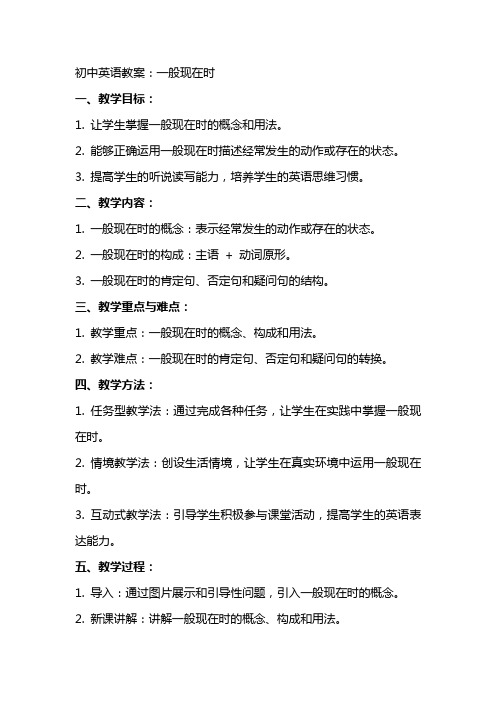
初中英语教案:一般现在时一、教学目标:1. 让学生掌握一般现在时的概念和用法。
2. 能够正确运用一般现在时描述经常发生的动作或存在的状态。
3. 提高学生的听说读写能力,培养学生的英语思维习惯。
二、教学内容:1. 一般现在时的概念:表示经常发生的动作或存在的状态。
2. 一般现在时的构成:主语+ 动词原形。
3. 一般现在时的肯定句、否定句和疑问句的结构。
三、教学重点与难点:1. 教学重点:一般现在时的概念、构成和用法。
2. 教学难点:一般现在时的肯定句、否定句和疑问句的转换。
四、教学方法:1. 任务型教学法:通过完成各种任务,让学生在实践中掌握一般现在时。
2. 情境教学法:创设生活情境,让学生在真实环境中运用一般现在时。
3. 互动式教学法:引导学生积极参与课堂活动,提高学生的英语表达能力。
五、教学过程:1. 导入:通过图片展示和引导性问题,引入一般现在时的概念。
2. 新课讲解:讲解一般现在时的概念、构成和用法。
3. 实例展示:用生活中的实例解释一般现在时的用法。
4. 练习巩固:让学生进行一般现在时的句子练习,纠正错误。
5. 小组活动:分组进行一般现在时的对话练习,培养学生的口语表达能力。
6. 课堂小结:总结本节课所学内容,让学生巩固一般现在时的知识点。
7. 课后作业:布置一般现在时的练习题,让学生回家后巩固所学知识。
六、教学评价:1. 课后收集学生的作业,评估他们对一般现在时的理解和运用能力。
2. 在下一节课开始时,进行一般现在时的口头测试,以检查学生对知识的掌握程度。
3. 观察学生在课堂上的参与度和小组活动中的表现,以评估他们的学习效果。
七、教学拓展:1. 邀请一位英语为母语的外国朋友或老师,让学生尝试与他们用一般现在时进行简单的对话。
2. 组织一次课堂游戏,如“一般现在时接龙”,让学生在游戏中更自然地运用所学知识。
3. 鼓励学生在日常生活中尝试使用一般现在时记录自己的日常活动,如写日记或制作时间轴。
(完整版)一般现在时标准教案.doc
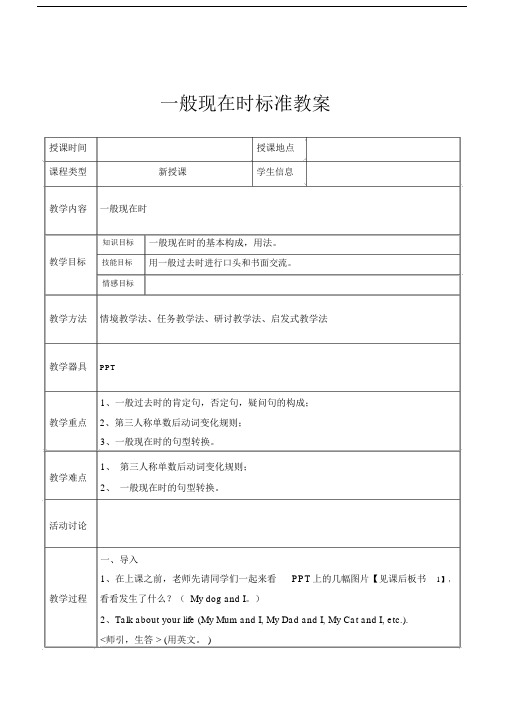
一般现在时标准教案授课时间授课地点课程类型新授课学生信息教学内容一般现在时知识目标教学目标技能目标一般现在时的基本构成,用法。
用一般过去时进行口头和书面交流。
情感目标教学方法情境教学法、任务教学法、研讨教学法、启发式教学法教学器具PPT1、一般过去时的肯定句,否定句,疑问句的构成;教学重点2、第三人称单数后动词变化规则;3、一般现在时的句型转换。
1、第三人称单数后动词变化规则;教学难点2、一般现在时的句型转换。
活动讨论一、导入1、在上课之前,老师先请同学们一起来看PPT上的几幅图片【见课后板书1】,教学过程看看发生了什么?( My dog and I。
)2、Talk about your life (My Mum and I, My Dad and I, My Cat and I, etc.).<师引,生答 > (用英文。
)*PPT 1, (I like sleeping in the morning, but Doggy gets up very early every day.) Teacher asks:“What does the dog do?”*PPT 2, (Doggy barks to me, he says,“Dear Tom, It’stime to get up.”)*PPT 3, (I feed Doggy every morning and every afternoon.) Teacherasks:“What do I do every morning and every afternoon?”*PPT 4, ( I say goodbye to him every morning when I leave for work.)Teacher asks:”What do I do every morning?”*PPT 1, (I walk my dog in the afternoon every day.)*PPT 2, (Doggy goes to his Health Club every Sunday.)Teacher asks:“Where does Doggy go every Sunday?”二、新授(一)同学们,以上的六幅图是这只我和小狗的日常生活,现在我们来一起回顾一下。
一般现在时教案模板范文

一、教学目标1. 知识目标:了解一般现在时的概念、构成和用法。
2. 技能目标:能够正确运用一般现在时进行表达,并能够辨别一般现在时与其他时态的区别。
3. 情感目标:激发学生学习英语的兴趣,培养良好的学习习惯。
二、教学重难点1. 教学重点:一般现在时的构成、用法以及与过去时、将来时的区别。
2. 教学难点:一般现在时中动词的变化形式,以及句型结构的运用。
三、教学过程(一)导入1. 教师通过展示一些日常生活中的图片或视频,引导学生思考这些场景中的人物正在做什么。
2. 学生分享自己观察到的内容,教师总结:这些动作都是经常发生的,我们可以用一般现在时来描述。
(二)新课导入1. 教师介绍一般现在时的概念:一般现在时用来描述经常性、习惯性的动作或存在的状态。
2. 教师讲解一般现在时的构成:主语 + 动词原形。
3. 教师展示一般现在时中动词的变化规则,并举例说明。
(三)课堂活动1. 学生练习:教师给出一些句子,让学生判断句子中的动词是否属于一般现在时,并说明理由。
2. 学生练习:教师给出一些动词,让学生根据动词的词尾变化规则,写出相应的动词原形。
3. 学生练习:教师给出一些句型,让学生根据句型要求,构造一般现在时的句子。
(四)巩固练习1. 教师组织学生进行角色扮演,用一般现在时描述场景中人物的动作。
2. 学生分组,每组选择一个主题,用一般现在时编写一段对话。
(五)课堂小结1. 教师总结一般现在时的构成、用法以及与过去时、将来时的区别。
2. 学生分享自己在课堂上的收获,教师给予点评和鼓励。
四、课后作业1. 完成课后练习题,巩固一般现在时的知识。
2. 收集生活中的一般现在时句子,下节课与同学分享。
五、教学反思1. 教师在教学中要注意引导学生积极参与,提高学生的学习兴趣。
2. 注重学生的实际运用能力,让学生在课堂上充分练习。
3. 关注学生的个体差异,给予不同层次的学生适当的指导。
一般现在时标准教案

一般现在时标准教案一、教学目标1. 让学生掌握一般现在时的概念和用法。
2. 能够正确运用一般现在时描述经常性和习惯性的动作、状态和特征。
3. 学会使用一般现在时的be动词和行为动词。
4. 能够听懂、说出一般现在时的句子。
二、教学内容1. 一般现在时的概念和用法。
2. be动词(am, is, are)的用法。
3. 行为动词(have, do, go, e, leave, arrive, eat, drink, sleep, read, write, listen, speak, etc.)的用法。
三、教学重点1. 一般现在时的结构:主语+ be动词+ 表语;主语+ 行为动词+ 宾语。
2. be动词的用法和辨析。
3. 行为动词的用法和辨析。
四、教学难点1. be动词在一般现在时的用法,特别是在主语为第三人称单数时。
2. 行为动词在一般现在时的用法,特别是在描述经常性和习惯性的动作、状态和特征时。
五、教学方法1. 任务型教学法:通过小组合作、角色扮演等活动,让学生在实际语境中运用一般现在时。
2. 情境教学法:创设生活情境,让学生在真实环境中感受和理解一般现在时。
3. 游戏教学法:设计趣味游戏,激发学生的学习兴趣,提高学生的参与度。
六、教学准备1. 教学PPT或黑板。
2. 教学卡片或图片。
3. 练习册和作业本。
4. 录音机或播放器。
5. 教学游戏材料。
七、教学过程1. 导入:通过歌曲、游戏或日常对话引入一般现在时的话题。
2. 呈现:用PPT、卡片或图片展示一般现在时的结构和相关词汇。
3. 讲解:讲解一般现在时的概念、用法和be动词、行为动词的辨析。
4. 练习:分组练习,让学生用一般现在时描述自己和同学的特征、习惯和动作。
5. 互动:学生之间进行对话,运用一般现在时进行交流。
6. 巩固:通过游戏、竞赛等活动巩固所学内容。
八、课堂作业1. 用一般现在时完成句子:I ____________________ (read) a book.She ____________________ (have) lunch at 12 o'clock.They ____________________ (go) to school bus.2. 编写一段对话,运用一般现在时描述日常生活中的事情。
初一英语语法教案

初一英语语法教案:一般现在时一、教学目标1.让学生掌握一般现在时的概念、构成和基本用法。
2.培养学生运用一般现在时进行简单句子的表达。
3.提高学生对英语语法的理解和应用能力。
二、教学重难点重点:一般现在时的构成和基本用法。
难点:如何在不同语境中正确运用一般现在时。
三、教学准备1.PPT课件2.教学视频3.练习题四、教学过程Step1:导入1.利用PPT展示一幅描绘日常生活场景的图片,引导学生用英语描述图片中的内容。
2.邀请几名学生分享他们的描述,并引导其他学生关注描述中的动词形式。
Step2:知识讲解1.通过PPT展示一般现在时的定义、构成和用法。
2.举例说明一般现在时的用法,如:Hegoestoschooleveryday.Shelikesapples.3.对比一般现在时和其他时态,帮助学生理解其特点。
Step3:视频教学1.播放一段关于日常生活场景的视频,让学生关注视频中出现的动词形式。
2.视频结束后,邀请学生分享他们观察到的动词形式,并讨论其是否符合一般现在时的用法。
Step4:练习巩固1.设计一些练习题,让学生在课堂上完成,检验他们对一般现在时的掌握情况。
2.邀请几名学生上台展示他们的答案,并给予评价和指导。
Step5:小组讨论什么是一般现在时?如何判断一个句子是否使用了一般现在时?举例说明一般现在时的用法。
2.每组选派一名代表进行分享,其他组员进行补充。
2.邀请学生分享他们在生活中遇到的一般现在时句子,并讨论其含义和用法。
3.布置作业:让学生用一般现在时写一篇关于自己日常生活的小作文。
Step7:课后反馈1.收集学生课堂练习和课后作业的反馈,了解他们对一般现在时的掌握情况。
2.针对学生的反馈,进行针对性的辅导和讲解。
五、教学反思本节课通过图片导入、知识讲解、视频教学、练习巩固、小组讨论等方式,让学生掌握了一般现在时的概念、构成和用法。
在教学过程中,注重学生的参与和互动,提高了他们对英语语法的理解和应用能力。
初中英语一般现在时教案

初中英语一般现在时教案教学目标:1. 让学生掌握一般现在时的概念和用法。
2. 能够正确运用一般现在时描述自己的日常活动和习惯。
3. 提高学生的英语听说读写能力。
教学内容:1. 一般现在时的概念和构成。
2. 一般现在时的用法。
3. 一般现在时的句子结构。
教学步骤:Step 1: 引入1. 向学生问候,并询问他们的日常活动,如“What time is it? What day is it today? What are you doing now?”等。
2. 引导学生思考一般现在时的概念,并提出问题:“Do you know what present continuous tense is?”。
Step 2: 讲解一般现在时1. 解释一般现在时的概念,即描述经常发生的事情或习惯。
2. 举例说明一般现在时的句子结构,即主语+动词原形。
3. 讲解一般现在时的构成,即主语+动词第三人称单数形式。
Step 3: 练习一般现在时1. 让学生分组,每组编写一段描述自己日常活动的对话,尽量使用一般现在时。
2. 让学生逐组进行对话表演,并鼓励他们尽量使用一般现在时。
3. 让学生用一般现在时写一篇简短的自我介绍,包括姓名、年龄、兴趣爱好等。
Step 4: 听力练习1. 播放一段听力材料,内容涉及一般现在时的句子。
2. 让学生听后回答问题,如“Who is the person? What does he/she like to do?”等。
Step 5: 读写练习1. 给学生发放一篇关于一般现在时的阅读材料,让学生阅读并回答相关问题。
2. 让学生写一篇短文,描述一个人的日常活动和习惯,尽量使用一般现在时。
Step 6: 总结和复习1. 让学生回顾一般现在时的概念和用法。
2. 回答学生提出的问题,并进行解答。
3. 强调一般现在时在日常生活中的重要性。
教学评估:1. 通过学生在课堂上的参与度和对话表演来评估他们对一般现在时的掌握程度。
一般现在时教案docx

4.He said the sun ____ (rise)in the east and ____ (set)in the west.
5.Shanghai ____ (lie) iБайду номын сангаас the east of China.
一般疑问句:Does +主语+动词原形+其它如:Does he swim well?Yes, he does. / No, he doesn't.
特殊疑问句:疑问词+以does开头的一般疑问句?如:How does your father go to work?
三、第三人称单数的动词变化规则(只有在第三人称为主语的肯定句中,动词才用三单式)
4. He often ________(have) dinner at home.
5. Daniel and Tommy _______(be) in Class One.
6. The girl _______(teach) us English on Sundays.
7. She and I ________(take) a walk together every evening.
3.Tom ________ ( study ) English, Chinese, Maths, Science and Art at school.
4.At eight at night, she __________( watch ) TV with her parents.
5.How many lessons________ your classmates______( have ) on Monday?
初中英语一般现在时教案
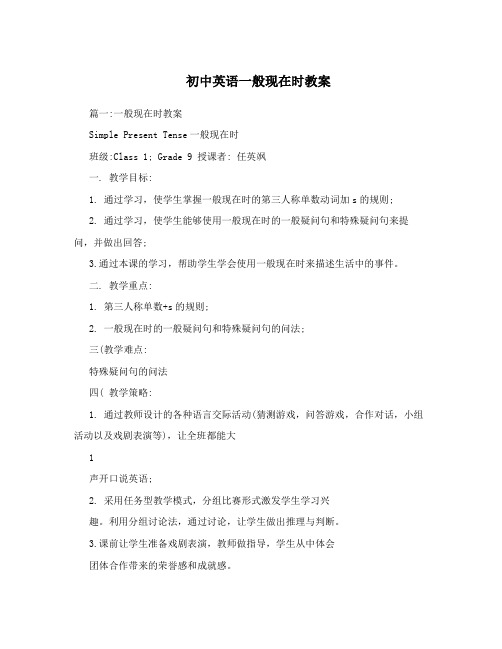
初中英语一般现在时教案篇一:一般现在时教案Simple Present Tense一般现在时班级:Class 1; Grade 9 授课者: 任英飒一. 教学目标:1. 通过学习,使学生掌握一般现在时的第三人称单数动词加s的规则;2. 通过学习,使学生能够使用一般现在时的一般疑问句和特殊疑问句来提问,并做出回答;3.通过本课的学习,帮助学生学会使用一般现在时来描述生活中的事件。
二. 教学重点:1. 第三人称单数+s的规则;2. 一般现在时的一般疑问句和特殊疑问句的问法;三(教学难点:特殊疑问句的问法四( 教学策略:1. 通过教师设计的各种语言交际活动(猜测游戏,问答游戏,合作对话,小组活动以及戏剧表演等),让全班都能大1声开口说英语;2. 采用任务型教学模式,分组比赛形式激发学生学习兴趣。
利用分组讨论法,通过讨论,让学生做出推理与判断。
3.课前让学生准备戏剧表演,教师做指导,学生从中体会团体合作带来的荣誉感和成就感。
五(教学活动过程:Leading-in:1. Warming-up: Sing a song “Heal the world” together.2. Revision: “My daily life”Ask one student to report her daily life. Then the teacher asks Ss some questions about her report.3. Review the concept of the “Simple present tense”. Then give them two wrong sentences to correct.Task 1: Play a guessing game.Guess what he/she does every day by using Simple Present Tense.Task 2: Find out the rules how to add “s” or “es” to the verbs when the subject is the single third person.they can to match the rules.Task 4: Ask strange questions about families.To practice the General Questions (一般疑问句). Ask the students to have a competition and2do a ask-and-answer activity.1. Does your father come from the moon?2. Do you often visit Yaoming?3. Does your mother always go shopping in Africa?4. Does your brother live in the sea?5. Does your dog enjoy computer games?6. Do you sell newspapers every night?7. Does your uncle copy your homework?8. Does your grandmother play basketball?9. Do your parents have a child?10.Does your aunt take a rocket to work every day?Task 5: Pairwork:Practice the Special Questions(特殊疑问句) according tothe information.1. --Where does she always do after class?-- She always reads books in the library.2. Where does she sometimes work?She sometimes shop in the supermarket.……Task 6: “名人来了”This is the show time. Ask some groups of students to present their report cards about the famous person. They3should use the Simple Present Tense to describe him/her. They can add pictures, songs, or actions to the performance to make it interesting.Summary :Review what we have learnt today with the students.1. 当主语是第三人称单数时,谓语动词如何加-s/-es;eats, walks, runs, drives, catches, watches, brushes, washes, boxes, discusses, cries, flies, plays, goes, does2. 一般现在时的陈述句,一般疑问句和特殊疑问句She waters the flowers.一般疑问句:Does she water the flowers?肯定回答:Yes, she does.No, she doesn’t.特殊疑问句:What does she water?She waters the flowers.Homework:完成课本一般现在时的练习篇二:一般现在时和现在进行时教案一般现在时和现在进行时复习课4教学设计12篇三:初中一般现在时教案一、复习预习1.一般现在时构成:(1)主要用动词的原形表示(2)主语是第三人称单数,动词原形变为第三人称单数形式 2.一般现在时的用法:(1)表示经常性或习惯性的动作或存在的状态 (2)表示客观事实或普遍真理(3 在时间、条件等状语从句中,用一般现在时表将来 (4)在某些以here, there开头的句子中表示正在发生的动作 3.与一般现在时连用的时间状语(1)表示频度的副词或词组always ,often, usually,sometimes,once a year等 (2)every day, in the morning,every year等时间状语二、知识讲解考点/易错点1单例:三15人He称plaies形(play)式易football出very错 well.2 答Danny案gos :(go)1to school plays2at 7:10. goes解析:1以辅音字母加y结尾的动词变单三人称形式才能把y换成i再加es;2与名词变复数不同,变单三人称形式以o结尾的词要加es.考点/易错点2对例答is.6另外,宾语从句中,从句部分若是表示客观真理,不管主句是何时态,从句都要用一般现在时;在时间和条件状语从句中,主句表将来,从句要用一般现在时。
初中英语一般现在时教案
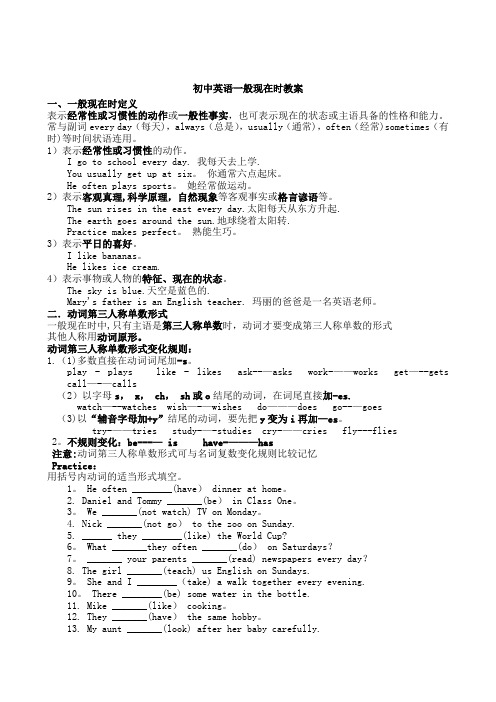
初中英语一般现在时教案一、一般现在时定义表示经常性或习惯性的动作或一般性事实,也可表示现在的状态或主语具备的性格和能力。
常与副词every day(每天),always(总是),usually(通常),often(经常)sometimes(有时)等时间状语连用。
1)表示经常性或习惯性的动作。
I go to school every day. 我每天去上学.You usually get up at six。
你通常六点起床。
He often plays sports。
她经常做运动。
2)表示客观真理,科学原理,自然现象等客观事实或格言谚语等。
The sun rises in the east every day.太阳每天从东方升起.The earth goes around the sun.地球绕着太阳转.Practice makes perfect。
熟能生巧。
3)表示平日的喜好。
I like bananas。
He likes ice cream.4)表示事物或人物的特征、现在的状态。
The sky is blue.天空是蓝色的.Mary's father is an English teacher. 玛丽的爸爸是一名英语老师。
二.动词第三人称单数形式一般现在时中,只有主语是第三人称单数时,动词才要变成第三人称单数的形式其他人称用动词原形。
动词第三人称单数形式变化规则:1.(1)多数直接在动词词尾加-s。
play - plays like - likes ask--—asks work-——works get—--gets call—-—calls(2)以字母s, x, ch, sh或o结尾的动词,在词尾直接加-es.watch—--watches wish—-—wishes do———does go--—goes (3)以“辅音字母加+y”结尾的动词,要先把y变为i再加—es。
try-——tries study-—-studies cry-——cries fly---flies2。
七年级上册英语一般现在时 教案

一般现在时(Simple Present Tense)一、教学目标:1. 语言知识目标:1) 学习be动词一般现在时的用法2)学习实义动词的一般现在时的用法二、教学重难点1. 教学重点:1) 总结一般现在时的肯定句、否定句、一般疑问句及其回答语的用法。
2) 理解并掌握英语句子中的人称与数,让学生牢记第三人称单数。
2. 教学难点:1)在实际生活情景中能正确运用Do…?或Does…?2) 理解并掌握英语句子中的人称与数,让学生牢记第三人称单数。
三、教学过程Step1. Warming- up and revision1. Greeting the Ss. Check their homework.2.Ask and answerT: Do you have a basketball?S1: Yes, I do.T: Does she have a basketball?S2: Yes, she does.T: Do you have a tennis bat?S3: No, I don't.T: Does he have a tennis bat?S4: No, he doesn't.Step2. Grammar Focus. 一般现在时(Simple Present Tense)1)1.表示现在的状态,例如:I’m twelve. I have three ping-pong balls and two ping-pong bats.2.表示经常的或习惯性的动作,常和时间状语usually, often, sometimes, on Monday, every day连用。
例如:“Where is my schoolbag?” Gina always asks.3.表示主语具备的性格和能力等,例如:Bill l ikes beef, but he doesn’t like chicken.2)在一般现在时中,be 动词用法口诀I (我)用am,you(你)用are,is用于he, she, it(他,她,它)。
一般现在时教学教案.docx
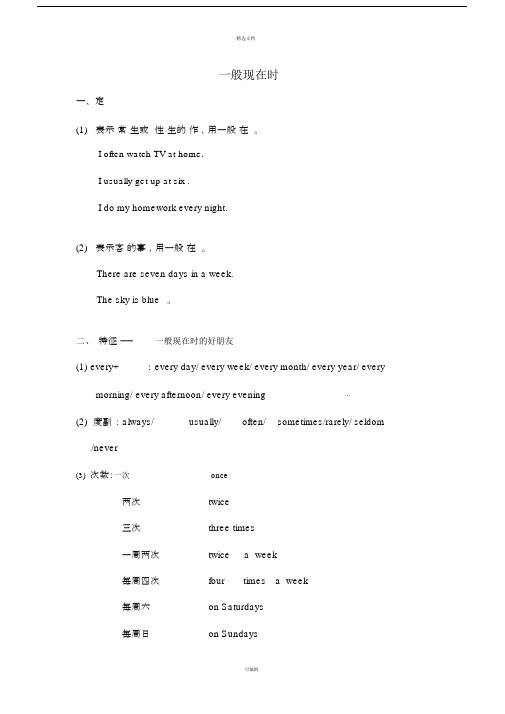
以辅音字母+ o结尾,一边加esgoes, does
辅音字母+ y结尾的单词,变y为I,加Worries, carries
es
特殊形式have---has
第三人称单数动词变化
★课堂巩固操练(造句)
1:Tom、clean the room
2:A Cat、eat fish
(2)They _____ (have, has ) some postcards.
(3)Tim ______(have, has) a new basketball.
(4)My sister ________(have, has) three green skirts.
(5)I _________(like, likes) playing称,则变问句时最好要变为第二人称。
e.g.:I usually have lunch at school.
→Do you usually have lunch at school? My father is playing soccer.
→Is your fath er playing soccer?
Is your father tall?——Yes,he is.\ No,he isn’t.
②助动词(do\does)+主语+动词原形(+其它)?
Yes,主语+do\does.No,主语+do\does not.
E.g.: Do you have a story book?——Yes,I do.\No,I don’t.
eg:Where do you do study English?
特殊疑问词+be动词+主语+其他?【即疑问词+一般疑问句的结构】
- 1、下载文档前请自行甄别文档内容的完整性,平台不提供额外的编辑、内容补充、找答案等附加服务。
- 2、"仅部分预览"的文档,不可在线预览部分如存在完整性等问题,可反馈申请退款(可完整预览的文档不适用该条件!)。
- 3、如文档侵犯您的权益,请联系客服反馈,我们会尽快为您处理(人工客服工作时间:9:00-18:30)。
初中英语一般现在时教案一、一般现在时定义表示经常性或习惯性的动作或一般性事实,也可表示现在的状态或主语具备的性格和能力。
常与副词every day(每天),always(总是),usually(通常),often(经常)sometimes (有时)等时间状语连用。
1)表示经常性或习惯性的动作。
I go to school every day. 我每天去上学。
You usually get up at six. 你通常六点起床。
He often plays sports. 她经常做运动。
2)表示客观真理,科学原理,自然现象等客观事实或格言谚语等。
The sun rises in the east every day.太阳每天从东方升起。
The earth goes around the sun.地球绕着太阳转。
Practice makes perfect. 熟能生巧。
3)表示平日的喜好。
I like bananas.He likes ice cream.4)表示事物或人物的特征、现在的状态。
The sky is blue.天空是蓝色的。
Mary’s father is an English teacher. 玛丽的爸爸是一名英语老师。
二.动词第三人称单数形式一般现在时中,只有主语是第三人称单数时,动词才要变成第三人称单数的形式其他人称用动词原形。
动词第三人称单数形式变化规则:1.(1)多数直接在动词词尾加-s.play —plays like —likes ask---asks work---works get---gets call---calls(2)以字母s, x, ch, sh或o结尾的动词,在词尾直接加-es.watch---watches wish---wishes do---does go---goes (3)以“辅音字母加+y”结尾的动词,要先把y变为i再加-es.try---tries study---studies cry---cries fly---flies2.不规则变化:be---- is have----has注意:动词第三人称单数形式可与名词复数变化规则比较记忆Practice:用括号内动词的适当形式填空。
1. He often ________(have) dinner at home.2. Daniel and Tommy _______(be) in Class One.3. We _______(not watch) TV on Monday.4. Nick _______(not go) to the zoo on Sunday.5. ______ they ________(like) the World Cup?6. What _______they often _______(do) on Saturdays?7. _______ your parents _______(read) newspapers every day?8. The girl _______(teach) us English on Sundays.9. She and I ________(take) a walk together every evening.10. There ________(be) some water in the bottle.11. Mike _______(like) cooking.12. They _______(have) the same hobby.13. My aunt _______(look) after her baby carefully.14. You always _______(do) your homework well.15. I _______(be) ill. I’m staying in bed.16. She _______(go) to school from Monday to Friday.17. Liu Tao _______(do) not like PE.18. The child often _______(watch) TV in the evening.19. Su Hai and Su Yang _______(have) eight lessons this term.20. -What day _______(be) it today? -It’s Saturday.21 We often ___________ (play) in the playground.22. He _________ (get) up at six o'clock.23. ________ you __________ (brush) your teeth every morning?24. What ________(do) he usually ________ (do) after school?25. Danny ____________ (study) English, Chinese, math, science and art at school.26. Mike sometimes __________ (go) to the park with his sister.27. At eight at night, she ____________ (watch) TV with her parents.28. ________ Mike _________ (read) English every day?29. How many lessons _________ your classmate _________ (have) on Monday?30.What time _________ his mother _________ (do) the housework?答案:1 has 2 are 3 doesn’t watch 4 doesn’t go 5 Do like 6 do do 7 Do read8 teaches 9 take 10 is 11 likes 12 have 13 look/is looking 14 do15 am 16 goes 17 does 18 watches 19 have 20 is 21 play 22 gets 23 Do brush24 does do 25 studies 26 goes 27 watches 28 Does read 29 does have 30 does do三、一般现在时的句型转换:1)当句子中有be动词或情态动词时变为一般疑问句:把be动词或情态动词(can,could等)提到主语的前面,肯定句的第一人称主语变为第二人称,句末用问号。
(口诀:一调二变三问号);变为否定句:在be动词或情态动词后面直接加not变成否定句. (口诀:be后not莫忘记) 例:①陈述句:I can play soccer.疑问句→ Can you play soccer? Yes,Ican./ No, I can’t.否定句→ I can not /can’t play soccer.②陈述句:She is my sister.疑问句→ Is she your sister? Yes, I am./ No, I’m not.否定句→ She is not/is n’t my sister.注意:对一般疑问句的回答:一般是用什么问就用什么来回答。
但以下例外:Is this a pencil? Yes , it is./ No, it isn’t.Is that your backpack? Yes , it is./ No, it isn’t.Are these your parents? Yes, they are./ No, they aren’t.2)当句子中没有be动词,也没有情态动词时变一般疑问句:在主语前加助动词do (主语是I, we, you,以及复数)或does(主语是第三人称单数she,he,it等,肯定句的第一人称主语变为第二人称,句末用问号。
变否定句:在主语后谓语动词前加助动词do not/don’t(主语是I, we, you,以及复数)或does not/doesn’t(主语是第三人称单数she,he,it等)变成否定句,切记:助动词后的动词则还原成动词原形。
例:①陈述句:We get up at 7:00 every morning.疑问句→Do you get up at 7:00 every morning?否定句→We don’t get up at 7:00 every morning.②陈述句:She has a brother.疑问句→ Does she have a brother?否定句→ She doe sn’t have a brother.Practice:一、按照要求改写句子1. She is always a good student.(改为一般疑问句,作否定回答)____________________________________________________________2. Sun Yang usually washes some clothes on Saturday.一般疑问句: ________________ __________ __否定句: ________ ___3. Tom does his homework at home.一般疑问句: ____________ ______ ___否定句: ________________ ______ _二、改错(划出错误的地方,将正确的写在横线上)1. Is your brother speak English? __________________2. Does he likes going fishing? __________________3. He likes play games after class. __________________4. Mr. Wu teachs us English. __________________5. She don’t do her homework on Sundays. _________________四、1 Is---Does 2 likes---like 3 play---playing 4 teachs---teaches 5 don’t --- doesn’t四、主语是第三人称单数的情况有如下几点:1)人称代词he, she, it作主语是第三人称单数。
